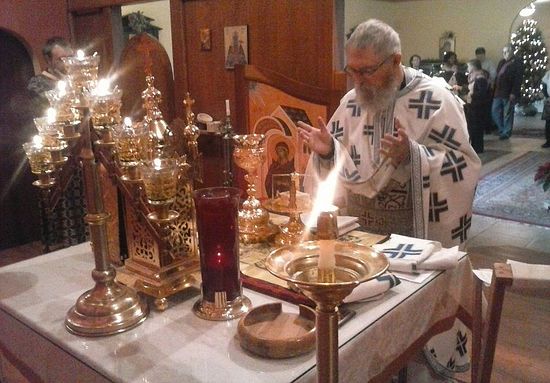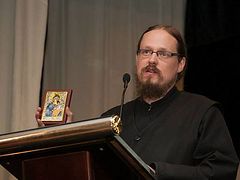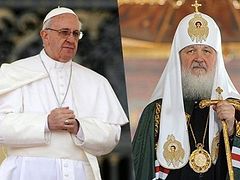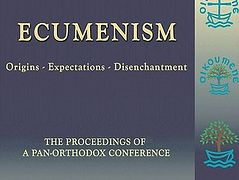Ecumenism is back in the news and with it comes a deluge of misunderstanding and theological confusion. For while “unity” and the very concept of “one” are actually inherently mystical, most who write about and discuss the topic substitute a merely human, political and administrative notion. Two key verses are frequently drawn from the 17th chapter of St. John’s gospel:
Now I am no longer in the world, but these are in the world, and I come to You. Holy Father, keep through Your name those whom You have given Me, that they may be one as We are. (Jn 17:11-12)
and
I do not pray for these alone, but also for those who will believe in Me through their word; that they all may be one, as You, Father, are in Me, and I in You; that they also may be one in Us, that the world may believe that You sent Me. (Jn 17:20-21)
Often overlooked in discussions is the fact that these statements come in the context of a prayer. It is not a commandment, nor is it a plea that Christ is offering to those who believe in Him. It is Christ’s prayer to the Father, part of what is often called the “High Priestly Prayer.” It is important to note that the unity referenced in this text is that of the Father and the Son and further, that the unity is described by the mystery of participation: “…one, as You, Father, are in Me, and I in You; that they also may be one in Us.”
The unity referenced in discussions (ecumenical or administrative) is rarely more than political or organizational. Schism is indeed a frightful thing, but not because it creates organizational and administrative problems. Schism risks a diminished participation in the life of God (at the very least), and the establishing of an alternative notion of salvation itself.
That God Himself is one is not a description of “how many Gods exist.” It is, instead, a reference to the very mode of God’s existing. As such, it is also a description of the mode of the life of salvation. To be saved, to live the life that is being saved “from day to day in fear and trembling” is nothing other than a mystical participation in the one life of the one God. Indeed, there is no other true existence. Christ’s prayer for us is not a plea for our future well-being, but a priestly prayer for our true participation and continuation in the One Life that is the only life.
This differs greatly from the usual content of ecumenical conversations. In those conversations, ecclesiology (the doctrine of Church) is separated from soteriology (the doctrine of salvation) – the Church is somehow considered as existing separate from salvation itself. But, the Church is salvation or it is nothing. It is not an organization that exists to promote salvation, or to represent the interests of Christians. Individuals are not saved as individuals, per se: they are saved within the life of the Church and as Church or they are not saved at all. The Church is what salvation looks like. For this reason, the New Testament can describe Baptism as a union with the death and resurrection of Christ (Romans 6:3-4) as well as a union with the Church:
For by one Spirit we were all baptized into one body [the Church]– whether Jews or Greeks, whether slaves or free– and have all been made to drink into one Spirit. (1Co 12:13)
Such statements are possible because the Church is the death and resurrection of Christ in this world. It is salvation. The Church does not, and cannot exist apart from salvation itself. They are not two things!
This understanding can be upsetting for many. Repeated schisms have destroyed the proper understanding of the Church and created a false notion of institutional and organizational entities. Affirmation of the Scriptural account of the Church and salvation are easily mistaken for a claim that only Orthodox Christians can be saved. What they do not hear, apparently, is a statement about the actual content of salvation. Salvation is not the answer to the question: “Who goes to heaven?” That idea is essentially a pagan concept and a distortion of the Christian gospel. Salvation is true participation in the life of God – “as You, Father, are in Me, and I in You; that they also may be one in Us…”
The sacramental expression of that one life is primarily found in the Eucharist, the Common Cup. Of course, “Common Cup” is itself an interesting expression, poorly understood. “Common” relates to “Communion.” But “Communion” is often simply a synonym for the Eucharist, i.e., nothing more than a word for a Church ritual. It is from the Greek, koinoniaor “participation.” The Common Cup is the Cup of Participation in the one life of Christ. “Whosoever eats my flesh and drinks my blood abides in me and I in them.”
And it is precisely in the aspect of “One” that the Cup seems to be problematic for us. As we draw near to the Cup, our proper desire should be to be one with Christ – that He may dwell in us and we in Him. We cannot approach the Cup with reservations – “I want to be One with Christ, but I reserve the right to my own opinions and actions.” It is simply a contradiction in terms. By the same token, we do not approach the Cup with reservations towards one another: “I want to be one with Christ but not one with him.” It is a sacrament of love which can never be a private moment between us and Christ alone.
This highlights the fragmentation that exists among Christians. For many, the Common Cup is, at best, a sign of the hope that someday we all might be one, or, at worst, only the expression of their private devotion. The refusal to extend the Common Cup on such a basis becomes a scandal for many. But for the Orthodox, the Cup is not a sign of hope, nor a private expression. It is the full and true reality of our present communion and participation in the One life of Christ.
The pain and scandal we experience when the Cup is refused to us, or when we must refuse the Cup ourselves, is nothing less than the judgment of God in the face of the one life of Christ. And the shame (and anger) we feel should be rightly directed – not towards a change of doctrine and practice, but towards a change within ourselves. When the conversation turns outward, and we seek to find a solution outside of ourselves, the entire reality of true union is shattered.
The Rich Young Ruler came to Christ and wanted to know what he could do to “inherit eternal life.” This is the question of true participation in the life of Christ. He is directed towards the commandments. Embracing them (or so he thinks), he wonders what more he can do (he recognizes that something is lacking). He is told to sell everything, give it to the poor and follow Christ. He goes away sad. Could he have protested that Christ was asking too much? Could he have pointed to others who had been asked less? Could he have discussed Christ’s implied economic theory and its unworkable demands? None of these things would have gained him true participation in Christ.
None of our own protestations regarding the Common Cup make any difference. True, most groups of Christians have dropped most requirements surrounding the Cup. Rich Young Rulers are now welcome. They are very often elected to governing boards and are considered to be important members of the community. They are often asked to speak and share the secrets of their success. Whatever is found in the Cup today, for most, it is not a true participation in the one life of Christ.
Christ’s High Priestly Prayer, is the declared intention of God to invite us into the life of true salvation. That life is nothing other than and nothing less than the very life of God Himself. It is not a fellowship of those who are fond of Jesus. It is not a token of membership. It is not a hope for something that will happen at a later time. It is not a sacrament of goodwill.
St. Simeon the Translator offers these thoughts before communion:
Stand in fear, O soul, as you look upon the deifying Blood for it is fire and burns the unworthy. May the divine Body sanctify and nourish me. May it deify my soul and wondrously feed my mind.
You have sweetened my longing for You, O Christ and transfigured me with Your love. Let my sins be consumed in the immaterial fire and grant me to be filled with Your joy, that I may rejoice in both and glorify Your coming, O good One.
Any union that is not fire, any union that cannot burn, is not our union in Christ. Put aside shame and anger and consider the true Cup of Christ. St. Symeon the Theologian offers this:
These things give me courage, rejoicing and trembling, they give me wings, my Christ, and I place my hope in the abundance of Your grace to us. I partake of the fire though I am dry grass. O wonder! – I am refreshed and not burned, as the bush of long ago, which was in flames but not consumed. Therefore, thankful in mind, heart and to the depths of my soul and body, I bow before You in worship and glorify You, my God, who are truly blessed now and in all ages. Amen.
Contemporary Christianity has taken the fire out of communion. As such, it becomes not the Common Cup, but merely a common cup. No fire. No God.
The One True God burns.




